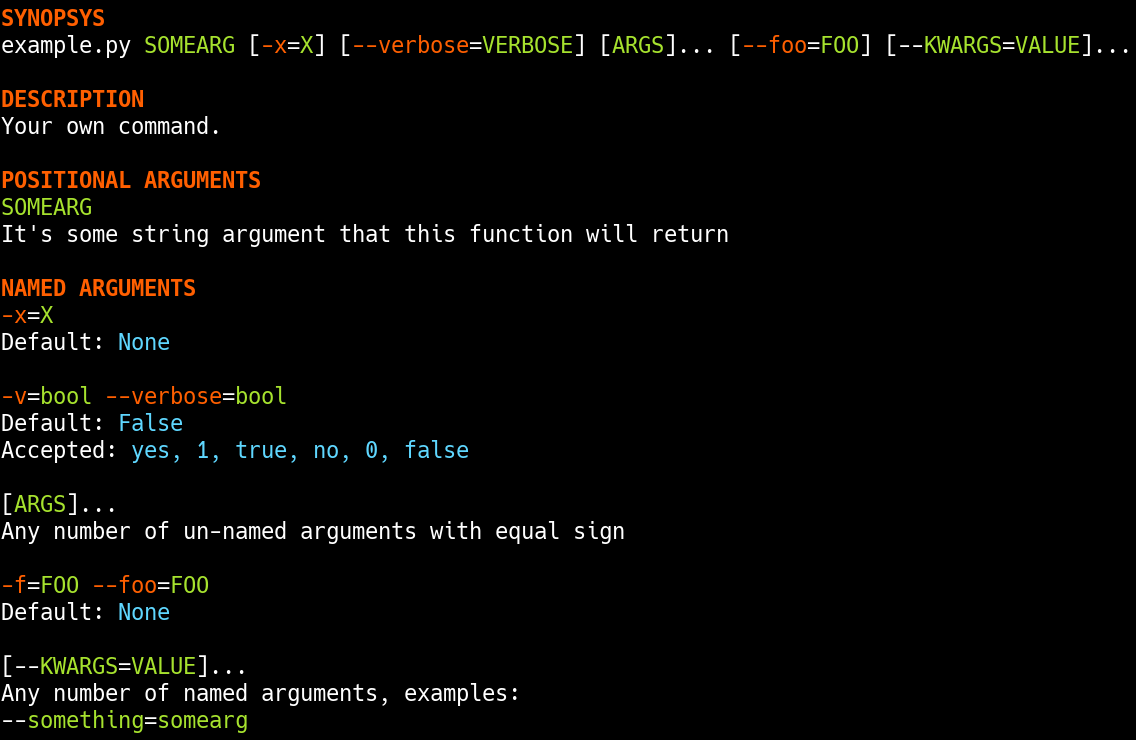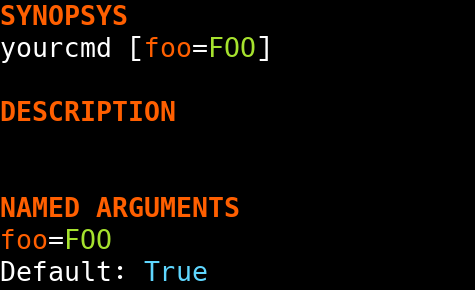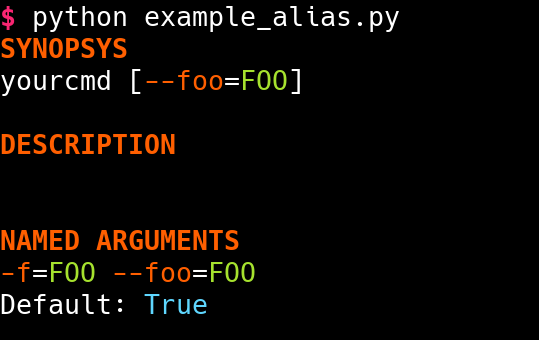Tutorial for cli2: Dynamic CLI for Python 3¶
Architecture¶
Overview¶
cli2 is built on 3 moving parts which you can swap with your own or inherit from with ease:
Command: Represents a target callback, in charge of CLI args parsing and execution, can serve as entry point.Group: Same as above, except that it routes multiple Commands, can serve as entry point as well.Argument: Represents a target callback argument, in charge of deciding if it wants to take an argument as well as casting it into a Python value.
You probably won’t care about the latter even for custom use cases.
Command¶
Create a command from any callable:
import cli2
def yourcmd(somearg: str):
"""
Your own command.
:param somearg: It's some string argument that this function will return
"""
return somearg
# this if is not necessary, but prevents CLI execution when the module is
# only imported
if __name__ == '__main__':
cli2.Command(yourcmd).entry_point()
Running the script without argument will show the generated help:

Complex signature¶
The same function with a rich signature like this:
def yourcmd(somearg, x=None, verbose : bool = False, *args, foo=None, **kwargs):
Will display help as such:

Posix style¶
You might prefer to have dashes in front of argument names in the typical style of command lines, you just need to enable the posix attribute:
cli2.Command(yourcmd, posix=True).entry_point()
In this case, help will look like this:

Testing¶
The parse() method will provision the
bound attribute which is a Python 3
BoundArguments instance, so you could test parsing as such:
cmd = cli2.Command(yourcmd)
cmd.parse('a', 'b', 'c=d')
assert cmd.bound.arguments == dict(somearg='a', x='b', kwargs={'c': 'd'})
Same if you want to use the posix style:
cmd = cli2.Command(yourcmd, posix=True)
cmd.parse('a', 'b', '--c=d')
assert cmd.bound.arguments == dict(somearg='a', x='b', kwargs={'c': 'd'})
Entry point¶
Another possibility is to add an entry point to your setup.py as such:
entry_points={
'console_scripts': [
'yourcmd = yourcmd:cli.entry_point',
],
},
Then, declare the command in a cli variable in yourcmd.py:
# if __name__ == '__main__': if block not required in entry point
cli = cli2.Command(yourcmd)
Group¶
Group can be used in place of
Command, and new commands can be added into it.
Decorator syntax¶
Example using cmd():
"""My command docstring"""
import cli2
cli = cli2.Group(doc=__doc__)
@cli.cmd
def yourcmd():
"""Your command"""
@cli.cmd(color='red')
def dangerzone(something):
"""A dangerous command"""
if __name__ == '__main__':
cli.entry_point()
As you can see, the decorator may be called with or without arguments, any
argument that are passed would override the default attributes from the
generated Command. Running this script without
argument will show:

Python API¶
Equivalent example using add():
import cli2
def yourcmd():
"""Your command"""
def dangerzone(something):
"""A dangerous command"""
if __name__ == '__main__':
cli = cli2.Group()
cli.add(yourcmd)
cli.add(dangerzone, color='red')
cli.entry_point()
Lazy loading: overriding Group¶
Equivalent example, but built during runtime, having the arguments at disposal:
import cli2
def yourcmd():
"""Your command"""
def dangerzone(something):
"""A dangerous command"""
class Cli(cli2.Group):
def __call__(self, *argv):
# you could use the *argv variable here
self.add(yourcmd)
self.add(dangerzone, color='red')
return super().__call__(*argv)
if __name__ == '__main__':
Cli().entry_point()
This is the same as the other command group examples above, but here the Group is built during runtime.
See the source code for the cli2 command, which implements an infitely lazy
loaded command tree based on introspection of the passed arguments with
extremely little code.
Lazy loading: using Group.load¶
You could also load commands more massively with the
load() method which will load any callable given as
Python object or as dotted python path, all the following work:
group = cli2.Group()
group.load(YourClass)
group.load(your_object)
group.load('your_module')
group.load('your_module.your_object')
Argument¶
Aliases¶
By default, named arguments are given aliases (CLI argument names) generated from their Python argument names. For example:
def yourcmd(foo=True):
print(foo)
cmd = cli2.Command(yourcmd)
cmd.help()
Will render help as such:

Posix¶
If posix mode is enabled, then a couple of dashes will prefix the Python argument name, and another one-letter-long alias with a single dash will be generated.

Overrides¶
You may overrides Argument attributes for a callable
argument with the arg() decorator:
@cli2.arg('foo', alias='bar')
def yourcmd(foo):
pass
This also takes a list of aliases:
@cli2.arg('foo', alias=['foo', 'f', 'foooo'])
def yourcmd(foo):
pass
This decorator basically sets yourcmd.cli2_foo to a dict with the alias
key.
Integers¶
Type hinting is well supported, the following example enforces conversion of an integer argument:
def yourcmd(i : int):
pass
cmd = cli2.Command(yourcmd)
cmd.parse('1')
assert cmd.bound.arguments == dict(i=1)
Boolean¶
Declare a boolean type hint for an argument as such:
def yourcmd(yourbool : bool):
You won’t have to specify the value of a boolean argument, but if you want to then:
- for
False: no, 0, false - for
True: yes, 1, true, anything else
Values don’t need to be specified, which means that you don’t have to type
yourbool=true, just yourbool or --yourbool in POSIX mode will set
it to True.
Since the mere presence of argument aliases suffice to bind a parameter to
True, an equivalent is also possible to bind it to False:
negate. It is by default generated by
prefixing no- to the argument name, as such, passing no-yourbool on the
command line will bind yourbool to False, or in posix mode by passing
--no-yourbool. Note that a single-dash two-letter negate is also generated
in posix mode, so -ny would also work to bind yourbool to False.
False¶
While the negates are set by default on boolean arguments, you may also set it on non-boolean arguments, just like you could override it like you would override aliases:
@cli2.arg('yourbool', negate='--no-bool')
def yourcmd(yourbool):
List and Dicts¶
Arguments annotated as list or dict will have CLI values automatically casted to Python using JSON.
def yourcmd(foo: list):
print(foo)
But be careful with spaces on your command line: one sysarg goes to one argument:
yourcmd ["a","b"] # works
yourcmd ["a", "b"] # does not because of the space
However, space is supported as long as in the same sysarg:
subprocess.check_call(['yourcmd', '["a", "b"]')
Typable lists and dicts¶
So, the above will work great when called by another program, but not really nice to type. So, another syntax for the purpose of typing is available and works as follow.
Arguments with the list type annotation are automatically parsed as JSON, if that fails it will try to split by commas which is easier to type than JSON for lists of strings:
yourcmd a,b # calls yourcmd(["a", "b"])
Keep in mind that JSON is tried first for list arguments, so a list of ints is also easy:
yourcmd [1,2] # calls yourcmd([1, 2])
A simple syntax is also supported for dicts by default:
yourcmd a:b,c:d # calls yourcmd({"a": "b", "c": "d"})
The disadvantage is that JSON decode exceptions are swallowed, but by design cli2 is supposed to make Python types more accessible on the CLI, rather than being a JSON validation tool. Generated JSON args should always work though.
Custom type casting¶
You may also hack how arguments are casted into python values at a per argument level, using decorator syntax or the lower level Python API.
For example, you can override the cast()
method for a given argument as such:
@cli2.args('ages', cast=lambda v: [int(i) for i in v.split(',')])
def yourcmd(ages):
return ages
cmd = Command(yourcmd)
cmd(['1,2']) == [1, 2] # same as CLI: yourcmd 1,2
You can also easily write an automated test:
cmd = cli2.Command(yourcmd)
cmd.parse('1,2')
assert cmd.bound.arguments == dict(ages=[1, 2])
Logging¶
By default, EntryPoint: will setup a default
logger streaming all python logs to stdout with info level.
Use the LOG environment variable to change it, ie:
LOG=debug yourcommand ...
LOG=error yourcommand ...
Or, disable this default feature with log=False:
cli = cli2.Group(log=False)
Tables¶
cli2 also offers a simple table rendering data that will do it’s best to word wrap cell data so that it fits in the terminal. Example:
cli2.Table(*rows).print()
Overridding default code¶
Argument overriding¶
Overriding an Argument class can be useful if you want to heavily customize an argument, here’s an example with the age argument again:
class AgesArgument(cli2.Argument):
def cast(self, value):
# logic to convert the ages argument from the command line to
# python goes in this method
return [int(i) for i in value.split(',')]
@cli2.arg('ages', cls=AgesArgument)
def yourcmd(ages):
return ages
assert yourcmd('1,2') == [1, 2]
Command class overriding¶
Overriding the Command class can be useful to override how the target callable will be invoked.
Example:
class YourThingCommand(cli2.Command):
def call(self, *args, **kwargs):
# do something
return self.target(*args, **kwargs)
@cli2.cmd(cls=YourThingCommand)
def yourthing():
pass
cmd = cli2.Command(yourthing) # will be a YourThingCommand
You may also override at the group level, basically instanciate your
Group: with the cmdclass argument:
cli = cli2.Group(cmdclass=YourThingCommand)
cli.add(your_function)
Global setup¶
A more useful example combining all the above, suppose you have two functions that take a “schema” argument that is a python object of a “Schema” class of your own.
class Schema(dict):
def __init__(self, filename, syntax):
""" parse file with given syntax ..."""
@cli.cmd
def build(schema):
""" build schema """
@cli.cmd
def manifest(schema):
""" show schema """
In this case, overriding the schema argument with custom casting won’t work because the schema argument is built with two arguments: filename in syntax!
Solution:
class YourCommand(cli2.Command):
def setargs(self):
super().setargs()
# hide the schema argument from CLI
del self['schema']
# create two arguments programatically
self['filename'] = cli2.Argument(
self,
inspect.Parameter(
'filename',
inspect.Parameter.POSITIONAL_ONLY,
),
doc='Filename to use',
)
self['syntax'] = cli2.Argument(
self,
inspect.Parameter(
'services',
inspect.Parameter.KEYWORD_ONLY,
),
doc='Syntax to use',
)
def call(self, *args, **kwargs):
schema = Schema(
self['filename'].value,
self['syntax'].value,
)
return self.target(schema, *args, **kwargs)
@cli.cmd
def build(schema):
""" build schema """
@cli.cmd
def manifest(schema):
""" show schema """
There you go, you can automate command setup like with the creation of a schema argument and manipulate arguments programatically!
Check cli2/test_inject.py for edge cases and more fun examples!
import inspect
import pytest
from unittest import mock
from .argument import Argument
from .command import Command
with open(__file__, 'r') as f:
lines = f.read().split('\n')
@pytest.mark.parametrize(
'kwargs, command, expected',
[
(
# test default enabled by default
dict(default=None),
[],
None,
),
(
# default should not be enabled
dict(),
[],
ValueError,
),
# test bools
(
# test default enabled by default
dict(default=True),
[],
True,
),
(
# note how defaults don't need annotation: they are enforced
dict(default=False),
[],
False,
),
(
# test enable
dict(default=False, annotation=bool),
['test'],
True,
),
(
# test disable, note how the annotation is needed
dict(default=True, annotation=bool),
['no-test'],
False,
),
],
)
def test_syntaxes(kwargs, command, expected):
kinds = [
inspect.Parameter.POSITIONAL_ONLY,
inspect.Parameter.POSITIONAL_OR_KEYWORD,
inspect.Parameter.KEYWORD_ONLY,
]
for kind in kinds:
kwargs['kind'] = kind
class TestCommand(Command):
def setargs(self):
super().setargs()
param = inspect.Parameter('test', **kwargs)
self[param.name] = Argument(self, param)
cbs = (
lambda: True,
lambda *a: True,
lambda *a, **k: True,
lambda **k: True,
lambda *a, test=False: True,
lambda *a, test=True: True,
)
for cb in cbs:
cmd = TestCommand(cb)
cmd.parse(*command)
code = lines[cb.__code__.co_firstlineno]
if isinstance(expected, type):
with pytest.raises(expected):
assert cmd['test'].value == expected, code
else:
assert cmd['test'].value == expected, code
def test_call():
sentinel = mock.sentinel.test_call
class TestCommand(Command):
def setargs(self):
super().setargs()
param = inspect.Parameter(
'test',
kind=inspect.Parameter.POSITIONAL_OR_KEYWORD,
default=sentinel,
)
self[param.name] = Argument(self, param)
# argument is passed when defined in signature
cmd = TestCommand(lambda test: test)
assert cmd() is sentinel
# but is not passed when not in signature
cmd = TestCommand(lambda: None)
assert cmd() is None
# we don't want no ValueError though
class TestCommand2(TestCommand):
def call(self, *args, **kwargs):
return self['test'].value
# argument value is available and passed as seen above
cmd = TestCommand2(lambda test: test)
assert cmd() is sentinel
# argument value is available and not passed as seen above
cmd = TestCommand2(lambda: None)
assert cmd() is sentinel
Edge cases¶
Simple and common use cases were favored over rarer use cases by design. Know the couple of gotchas and you’ll be fine.
Args containing = when **kwargs is present¶
Simple use cases are favored over rarer ones when a callable has varkwargs.
When a callable has **kwargs as such:
def foo(x, **kwargs):
pass
Then, arguments that look like kwargs will be attracted to the kwargs
argument, so if you want to call foo("a=b") then you need to call as such:
foo x=a=b
Because the following will call foo(a='b'), and fail because of missing
x, which is more often than not what you want on the command line:
foo a=b
Now, even more of an edgy case when *args, **kwargs are used:
def foo(*args, **kwargs):
return (args, kwargs)
Call foo("a", b="x") on the CLI as such:
foo a b=x
BUT, to call foo("a", "b=x") on the CLI you will need to use an
asterisk with a JSON list as such:
foo '*["a","b=x"]'
Admittedly, the second use case should be pretty rare compared to the first one, so that’s why the first one is favored.
For the sake of consistency, varkwarg can also be specified with a double asterisk and a JSON dict as such:
# call foo("a", b="x")
foo a **{"b":"x"}
Calling with a="b=x" in (a=None, b=None)¶
The main weakness is that it’s difficult to tell the difference between a keyword argument, and a keyword argument passed positionnaly which value starts with the name of another keyword argument. Example:
def foo(a=None, b=None):
return (a, b)
Call foo(b='x') on the CLI like this:
foo b=x
BUT, to call foo(a="b=x") on the CLI, you need to name the argument:
foo a=b=x
Admitadly, that’s a silly edge case. Protect yourself from it by always naming keyword arguments …
… Because the parser considers token that start with a keyword of a keyword argument prioritary to positional arguments once the positional arguments have all been bound.